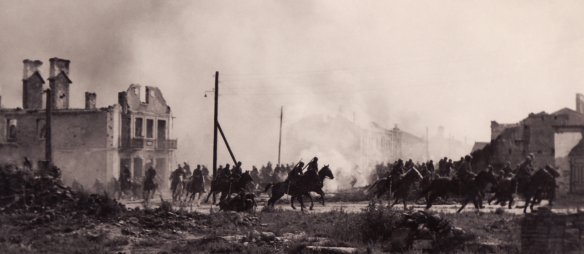
Just 75 years ago, the devastating war arrived to Europe – and this brave Polish cavalry perished fighting tanks. These days tanks are again rolling – and Europe needs to find a way to stop them.
The summit of the North Atlantic Treaty Organization (NATO) that opens in the Welsh Celtic Manor resort tomorrow (September 4) will feature the Ukraine crisis as an agenda item of top priority and extreme urgency. Only a week ago, this crisis appeared manageable as Russian President Vladimir Putin shook hands with his Ukrainian counterpart, President Petro Poroshenko, in Minsk under the watchful eye of Catherine Ashton, the European Union’s High Representative for Foreign Affairs and Security Policy. The next day, however, Russian tanks rolled into the border city of Novoazovsk, catching the Ukrainian forces in the rear and altering the course of hostilities in eastern Ukraine (Kommersant, August 28). For weeks prior to that direct intervention, the rebel forces had been in retreat toward the strongholds in Donetsk and Luhansk, but the arrival of reinforcements from Russia set off a counter-offensive, in the course of which several Ukrainian battalions were surrounded (Polit.ru, August 29).
The pro-Russia forces have not made any further advances so far, not even toward the strategically significant but defenseless Mariupol. Thus, the Russian intervention has stopped just short of a full-blown invasion for the time being, although some 10,000 troops are standing ready along the border with Ukraine (Novaya Gazeta, August 28). Putin has thus delivered a hard blow that is supposed to prove his point: Kyiv cannot win the war against the separatist forces in Donbas. At the same time, however, he has not committed himself to an overt war with Ukraine, which is far from popular in Russian public opinion (Slon.ru, August 28). Apparently, no one in the Kremlin realizes that this strong move has hamstrung the Ukrainian leadership from being able to pursue any kind of political compromise, because doing so would amount to Kyiv capitulating to external aggression. Consequently, the road-maps discussed in Minsk have been effectively canceled (Vedomosti, August 28). Poroshenko presented his case at the EU summit in Brussels, on August 30, explaining that the “anti-terrorist operation” (never an accurate term) has been transformed into a desperate defense against Russian intervention—as a result, he secured an increase in aid as well as a decision to enforce new sanctions (Gazeta.ru, August 31).
The rest of the article is in EDM, 3 September 2014.